



1120 On Jan. 16 the Council of Nablus, convened by Jerusalem King Baldwin II and Patriach Warmund establishes 25 canons along with the limits of secular and religious authority, beoming the first written laws of the Latin Kingdom of Jerusalem; Hugues de Payens obtains permission from Baldwin II and Warmund to found the Knights Templar. On June 17 the Aragonese under king (since Sept. 28, 1104) Alfonso I the Battler (Warrior) (1073-1134) adided by Duke William IX the Troubadour of Aquitaine (1071-1127) decisively defeat a Murabitun army with Andalusian volunteers led by Ibrahim ibn Yusuf at the Battle of Cutanda near Calamocha (Teruel), after which they capture the fortified towns of Calatayud and Daroca. On Sept. 24 Welf II/V (b. 1072) dies without heirs, leaving his brother (2nd son of Welf I/IV and Judith of Flanders) Henry IX the Black (-1126) as duke of Bavaria (until Dec. 13, 1126), who marries Wulfhild, daughter of Duke Magnus of Saxony, acquiring part of the Billung lands in Saxony. Peace is declared between Henry I of England and Louis VI the Fat of France, ending the Second French-Norman War (begun 1116); too bad, on Nov. 25 Henry I's only legitimate son and heir Prince William Adelin (Aetheling) (b. 1103) (son of Edith-Matilda, a descendant of King Alfred, causing him to be part Norman and part Saxon, boding well for the Anglo-Saxon dogs if he became king?), along with a large party of nobles returning from his marriage the previous year drown in the White Ship after it hits a rock in the English Channel off Barfleur at night on the way back from France and sinks; William initially survives, then drowns while attempting to rescue Countess Matilda of Perche, his half-sister; Stephen of Blois, who later usurps the English throne disembarks just before the ship sails due to a bout of diarrhea (a conspiracy?); Henry never smiles again; William's widow Isabella d'Anjou takes vows and becomes abbess #2 of Fontrevault (Fontrevaud) Abbey in the Loire Valley in Anjou (constructed in 1110-19 by Robert d'Abrissel), starting a string of rich and/or noble abbesses for this abbey, which coincidentally has both nuns and monks, and is where Henry II and Eleanor of Aquitaine are buried - there's no limit with a five-G buy? Roderic O'Connor dies (1118), and his youngest son, Connacht king (1106-56) Toirdhealbhach Ua Conchobhair (Tairrdelbach Ua Conchobair) (Turlough Mór O'Connor) (O'Conor) (1088-1156) becomes high king of Ireland (until 1156), becoming the greatest Irish warrior king of the cent. In the winter (1120-1) Boleslav III of Pomerania sieges and conquers the Pomeranian capital city of Stettin, massacring 18K and transporting another 8K (whole familes) to Poland, becoming ruler of depopulated Pomerania and finally gaining access to the Baltic Sea (until 1123), stinking himself up more by trying to Christianize the remnant (fine example he set?), finding no Polish bishops willing to take him up and having to import Spanish bishop Bernard, who soon flees to Bamberg, getting Otto of Bambert to take his place in 1124. The Muslim rulers of Damascus send the Arab Maan (Ma'an) Tribe from Hadramaut, Yemen to take on the Crusaders in the seaport of Beirut and keep them from moving inland; they end up settling in the SW slopes of the Lebanon Mts. and converting to the Druze Muslim sect. Song Jiang leads the rebellion of the 108 Liang Shan Heroes. The hospital-running Hospitalers in the Holy Land become militarized about this time - fill the Saracens' hospitals? The Byzantines under John II Comnenus begin a campaign against the Seljuks in Anatolia (ends 1121). Vladislaus I deposes Borivoj II and endows him with Znojmo. The White Canon Norbertines (Premonstratensians) Roman Catholic religious order of canons regular is founded in Premontre (near Laon), France by (St.) Norbert (Gennep) of Xanten (1080-1134), who follows the Rule of St. Augustine but with greater austerity based on his connections with St. Bernard of Clairvaux. In this decade European writers begin using common languages instead of Old Man Latin. In this decade Scholastic Philosophy reaches its full development. Freiburg (Ger. "free town") on the Dreisam River at the foot of the Schlossberg in SW Germany situated at the entrance to the Black Forest is founded by HRE Konrad and Duke Bertold III of Zahringen, becoming the seat of an archiepiscopal seat and a univ., then growing into a major commercial center, the sunniest and warmest town in Germany. Inventions: About this time the Chinese invent playing cards - you lose, they kick you in the butt, and then what? Nonfiction: Lambert of St. Bertin (1060-1125), Historia Comitum Normannorum, Comitum Flandriae. Births: Swedish king (1155-60) Eric IX (the Lawgiver) (the Saint) (d. 1160); feast day: May 18. French Capetian king (1137-80) Louis VII (the Young) (Le Jeune) (d. 1180); 2nd son of Louis VI the Fat (1081-1137) and Adelaide of Maurienne (Savoy) (1092-1154); father of Philip II Augustus (1165-1223). English philosopher-historian-diplomat and bishop of Chartres (1176-80) John of Salisbury (Johannes Parvus) (John the Little) (d. 1180) in Salisbury; of Anglo-Saxon descent; student of Peter Abelard at the U. of Paris. Deaths: English prince William of Adelin (Atheling) (b. 1103) on Nov. 25 off Barfleur, Normandy (drowned).
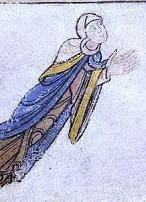

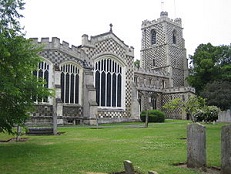
1121 On Jan. 24 Henry I of England marries his 2nd wife Adeliza (Adelicia) (Adela) (Aleidis) of Louvain (1103-51), "the fair maiden of Brabant", daughter of Count Godfrey I of Louvain. In Apr. Pope Calixtus II returns to Rome with an imperial-Italian army, and captures and deposes Antipope Gregory VIII, imprisoning him in the Fortress of Sutri, then transferring him from prison to prison until he dies near Salerno; he sends three cardinals, who meet with HRE Henry V in Oct. in Wurzburg to work out a truce; meanwhile in the spring Pope Calixtus II destroys the Fortress of Frangipani in Rome and prohibits its reconstruction - arrest a pope, will ya? On Aug. 12 the Battle of Didgori 25 mi. SW of Tbilisi sees 55.6K Georgians under David IV defeat 300K Seljuks under Najm ad-Din Ilghazi ibn Artuq (-1122), and kick them out of the Caucasus, establishing Tbilisi as the Georgian capital, bringing a golden age to Georgia. The Byzantines recover SW Anatolia from the Seljuks, but have to break off and take on invading Patzinaks in the Balkans. The Aragonese capture Calatayud; the Cordobans revolt against the Murabitun, and drive the gov. and his troops from the city; emir Ali ibn Yusuf ibn Tashfin leads an army from Africa that suppresses the revolt, sieges the city, and forces the Cordobans to surrender. The original K-Mart sucks? Moroccan Arab Abu Abdullah Muhammad ibn Tumart (1078-1130) leads a Muslim Unitarian religious-based revolt against the Almoravids in N Africa, rejecting their Maliki school of law and realistic anthropomorphism and calling for a purification of the faith under the doctrine of the unity of God, and is proclaimed Al Mahdi ("the guided"); after fleeing to the mountains of Morroco, he converts Iranian Sufi Hintata tribal confederation chief Abu Hafs Umar al-Suhrawardi (1144-1234), and begins a victory tour, founding the Berber Almohad (al-Muwahhidun) (Benemerine) Dynasty in Morocco (ends 1236), which goes on to absorb Algeria (1151), Tunis and Tripolitania (1160), and Al-Andalus (Spain) (1172). The Council of Soissons condemns Peter Neverhard, er, Abelard's Treatise on the Trinity, makes him burn it, and orders him jailed; after his release he returns to the Abbey of St. Denis in Paris, but the pissed-off monks force him to leave, and he moves to Nogent-sur-Seine, where he builds the chapel-oratory called Paraclete - they cleted his pair already? Alexander I of Scotland imports the first Arabian stallion and presents it to the Church of St. Andrews in Fife; meanwhile Henry I imports Arabian stallions to improve pony-sized Irish Hobby (Hoblin) horses. Architecture: Reading Abbey in Berkshire, England is founded by Henry I. Robert, 1st Earl of Gloucester builds St. Mary's Church in Luton, Bedfordshire, England. The 3rd and largest church at Cluny Abbey in France is completed. Nonfiction: Anon., The Peterborough Chronicle; first written example of spoken English rather than the pure lit. language Standard West Saxon. Births: Polish king (high duke) (1146-73) Boleslaw (Boleslav) (Boleslaus) IV (the Curly) (d. 1173) (b. 1125?); son of Boleslav III the Wry-Mouthed (1085-1138) and 2nd wife Salome von Berg-Schelklingen (1093-1144) (daughter of Duke Henry of Berg). Deaths: French nominalist scholar Roscellinus of Vannes (b. ?); teacher of Peter Abelard (-1142).
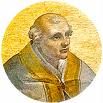

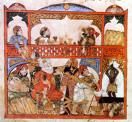
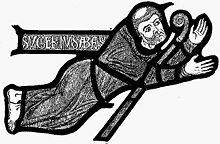


1122 You're still the one one, two two? On Sept. 23 HRE (1106-25) Henry V (1081-1125) and Pope (since 1119) Calixtus II (1064-1124) sign the Concordat of Worms, forfeiting any right to invest bishops with spiritual authority (ring and crozier), ending the Investiture Dispute (begun 1075), but retaining controlling influence in the election of German bishops, who retain political power, settling the long-standing (since 962) ultimate male investiture power struggle between the Roman Catholic Church and the HRE, and becoming Pope Calixtus II's big claim to fame; Henry IV is restored to the Church; from now on being HRE backfires on German kings as they neglect their German duties for their imperial ambitions, keeping Germany from centralizing and letting it slide into a multiplicity of one-horse-town states; too bad, the church vs. state investiture controversy coopts the German intelligentsia, who neglect the study of philosophy, law, lit. etc., causing them to fall behind W Europe until the 14th cent. On Oct. 20 after suffering a stroke on July 11, 1119, Ralph d'Escures dies, and the see remains vacant until July 22, 1123. The Byzantines under emperor John II Comnenus exterminate the Patzinak Turks in the Balkans at the Battle of Beroia (Boruy) (Eski Zagra), ending their threat. Henry I of England creates the earldom of Gloucester for his bastard son Robert Fitzroy "Rufus" of Caen (1090-1147), who becomes the first earl of Gloucester. After getting in trouble in Chartres for his Platonic realism, French scholastic philosopher William of Conches (1090-1155), known for studying secular classics incl. Muslim works translated by Constantine the Africa, and for encouraging empirical science becomes the tutor of Henry Plantagenet. Louis VI the Fat's tutor (of peasant stock) Suger (1081-1151) becomes abbot of St. Denis, developing into a statesman in the curia regis, influencing Louis VI and Louis VII. The Byzantines refuse to renew their trading privileges with the Venetians, causing Venice to declare war (ends 1126). The Aragonese take Daroca S of Zaragoza. Architecture: Romanesque Piacenza Cathedral in Emilia-Romagna, N Italy is begun (finished 1233). Science: About this year Greek Asia Minor slave Abu'l Fath al-Khuzini pub. Kitab Mizan al-Hikmah (Book of the Balance of Wisdom), summarizing Muslim knowledge of physics, incl. the lever, specific gravity, and gen. gravity as a universal force drawing all things toward the center of the Earth. Births: German Hohenstaufen duke of Swabia (1147-52), German king (1152-90), Italian king (1155-90), HRE (1155-90), and king of Burgundy (1178-90) Frederick (Ger. "peaceful ruler") I Barbarossa (Ger. "red beard") (d. 1190); son of Hohenstaufen Duke Frederick II of Swabia and Judith of Bavaria (-1131), daughter of Welf Duke Henry IX the Black of Bavaria (-1126); nephew of Conrad III (1093-1152); unites the rival houses of Hohenstaufen and Welf. French queen consort (1137-52) and English queen consort (1154-89) Eleanor (Alienor) (Aliénor) of Aquitaine (d. 1204) in Belin Castle, Aquitaine; daughter of redhaired Duke William X of Aquitaine the Saint (1099-1137) and Duchess Aenor de Chatelleraut (1103-30); "The first woman in the history of civilized Europe to have the experience of choosing her husband, leading an army, going to war, and ruling over countries for considerable periods of time" (Thomas Cahill). Deaths: English archbishop (of Canterbury) Ralph d'Escures (b. ?) on Oct. 20. Persian poet-mathematician-scientist Omar Khayyam (b. 1048) on Dec. 4; leaves Revision of the Old Persian Solar Calendar, Works on Algebra (quadratics and cubics), and The Rubaiyat (Quatrains) (rhyming aaba); "I sometimes think that never blows so red/ The rose as where some buried Caesar bled"; "One thing is certain, and the rest is lies;/ The flower that once has blown forever dies"; "Myself when young did eagerly frequent/ Doctor and Saint, and heard great argument/ About it and about; but evermore/ Came out by the same door as in I went"; "Some go for the pleasures here below/ Others yearn for the Prophet's Paradise to come/ Ah, take the cash and let the credit go,/ Nor heed the rumble of a distant drum." "A book of verses underneath the bough,/ A jug of wine, a loaf of bread, and thou/ Beside me singing in the wilderness/ Oh, wilderness were Paradise enow!"; "The Moving Finger writes, and having writ,/ Moves on, nor all thy piety nor wit/ Shall lure it back to cancel half a line,/ Nor all thy tears wash out a word of it." Muslim Arab poet Abu Muhammad al-Qasim al-Hariri (b. 1054); leaves Maqamat al-Hariri (The Assemblies of Hariri), 50 anecdotes. French scholar Guillaume de Champeaux (b. 1070).
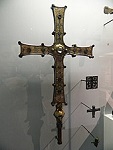
1123 On Jan. 10 Robert Bloet dies in Woodstock, England while riding with Henry I and Bishop Roger of Salisbury, and on July 22 Alexander of Lincoln (-1148), nephew of Bishop Roger of Salisbury becomes bishop of Lincoln (until Feb. 1148), becoming known for his ostentatious luxurious lifestyle and his patronage of Geoffrey of Monmouth Henry of Huntingdon, Christina of Markyate, and Gilbert of Sempringham. On Feb. 8 French-born (in Corbeil near Paris) William of Corbeil (-1136) becomes Canterbury archbishop #38 (until Nov. 21, 1136), and after Archbishop Thurstan of York refuses to consecrate him, his own suffragan bishops do it; he then travels to Rome to receive the 3-fingers-wide white lamb's wool pallium (scarf), with five black crosses and three gold pins to represent Christ's five wounds and the three nails on his Cross, finding that Thurstan had sent emissaries ahead of him to stop it, but Henry I and HRE Henry IV intervene, and he gets it - look at me now, boys? On Mar. 18-27 the First Lateran (9th Ecumenical) Council, convoked in Dec. by Pope Calixtus II, attended by 300 bishops confirms the Concordat of Worms, and passes a lot of other clerical beeswax, incl. suppressing simony, and prohibition of marriage of and concubinage among priests (priestly celibacy). On May 29 after King Baldwin II of Jerusalem is captured while patrolling in Edessa, the unsuccessful Battle of Yibneh (Yibna) (Ibelin) between Ascalon and Jaffa becomes the last attempt by the Egyptian Fatamids to invade the kingdom of Jerusalem, getting crushed by a Crusader force led by new Jerusalem regent-constable Eustace Grenier (Garnier) (-1123), who dies on June 15, and is replaced as regent-constable by Fresh, er, French prince of Galilee (since 1119) William (Guillaume) I of Bures (-1142). Byzantine Emperor John II Comnenus defeats the Serbs. Poland reestablishes access to the sea. Emperor (since 1107) Toba (b. 1103) is forced to abdicate by his cloistered grandfather emperor Shirakawa in favor of his 4-y.-o. son Sutoku (1119-64) (personal name Ahihito), who becomes Japanese Yamato emperor #75 (until 1142), going on to celebrate his 1st anniv. with a carriage procession outside the capital city to contemplate the flowers, attended byretired emperors Horikawa and Toba, with the nobles dressed in hunting clothes and the noblewomen in colorful dress, along with musicians and other performers; he later spends a 3-year exile copying the 10.5K-word Buddhist religious work Lankauarn Sutra in his own blood. The O'Malley Clan in Ireland becomes pirates, becoming known as the Sea Gods (Mannanain) of the Western Sea. The church's Truce of God, which covers France, Germany, Italy, Flanders, and Spain is now backed by threat of excommunication. The town of Smithfield in NW London near Aldersgate becomes the home of St. Bartholomew's Priory, going on to host Bartholomew's Fair starting in 1133 and become the place of execution for heretics and political criminals incl. Sir William Wallace and Wat Tyler; St. Bartholomew's Hospital (AKA Bart's) in Smithfield, London is founded, becoming the oldest hospital in Europe. Art: The Cross of Cong (Gael. "An Bacall Bui" = the yellow baculum) ornamental cusped processional cross is made for Irish high king Tairrdelbach Ua Conchobair of Connacht, ending up in Cong Abbey in Cong, County Mayo. Deaths: French bishop Marbod of Rennes (b. 1035) on Sept. 11 in Angers; leaves Liber Lapidum, a poem describing the occult qualities of 60 precious stones, incl. sapphire, which results in a more favorable answer from God when held in the hand during prayer, opal, which makes one invisible when held folded in a bay leaf, diamond, which makes one invincible, and amethyst, which makes one immune to intoxication. Italian Benedictine abbot St. Bruno (b. 1048); canonized in 1183. German count #1 of Anhalt Otto of Ballenstedt (b. 1070) on Feb. 9. English bishop of Lincoln (1093-1123) Robert Bloet (Bloett) (Bluett) (b. ?) on Jan. 10 in Woodstock, Oxfordshire; dies while riding with Henry I and Bishop Roger of Salisbury, dying in the king's arms without receiving absolution, causing many to conclude that he ended up in Hell; last words: "I am dying".



1124 On Apr. 23 Scottish king (since Jan. 8, 1107) Alexander I (b. 1077) dies in Stirling after "holding his kingdom with a great deal of effort", and his bastard son Malcolm, supported by the Gaelic nobles fights for the crown, but Queen Margaret Aetheling's legit son (by Malcolm III Canmore) David I (1084-1153) becomes Canmore king of Scotland (until May 24, 1153), the last Scottish king to succeed by matrilineal descent (Margaret's 3rd straight son to be king, after Edgar I and Alexander I), and the first feudal (Norman) monarch of Scotland; raised in England and married (1113) to Matilda de Senlis, countess of Northampton, he almost balks at the nobles-only (no priests) Scottish coronation ceremony at Scone, then goes on to establish a feudal system, efficient bureaucracy, Scottish law code and system of sheriffdoms, merchant navy and trade links with Europe, and improved agriculture, and mints Scotland's first native coinage (with silver from royal mines at Alston in Cumberland); a good military man, he extends Scotland's borders to the Tees River, incl. all of Northumberland, creating a "Scoto-Northumbrian" realm, but later mellows and ends up super-religious, finally projecting an image of a long-haired bearded Solomon who cancels hunting trips to hear pleas from widows and the poor, while bleeding the royal treasury dry to fund pious works, causing James I to later call him "ane sair sanct for the croune" (a sorry saint for the crown); from day one he dispossesses the native Scots of their land S of the Forth River and grants it to his Anglo-Norman aristocracy, incl. Robert de Brus (Bruce), who is given Annandale, then Hugh de Morville, Robert Avenel, Walter Fitz Alan (founder of the Stewart Dynasty), the Baliols, Lindsays, and Somervilles; the common Scots end up as serfs for the sell-out aristocracy, while the remaining great Gaelic lords, incl. the Earl of Fife and Earl of Strathearn remain loyal (waiting for a hero to arise to help them fight for their free-ee-dom?); the two classes of serfs and freemen who are bonded to the king are established (until the 14th cent.); David I Romanizes the Scottish Celtic Church, appointing his chaplain John as bishop of Glasgow, and moves the monks from Selkirk to Kelso to be near his new seat of power at Marchidun Castle on the Scottish borders between the Teviot and Tweed Rivers (S of Kelso), which he renames Roxburgh Castle in 1128, which becomes the residence of the Scottish kings until 1297; he creates the title of "high steward of Scotland" (in the royal household) for the FitzAlan clan, which by the time of David II becomes purely honorary, causing them to be called the House of Stewart (Stuart); the first Scottish coins are struck. On Oct. 8 after being released from Aleppo, Baldwin II turns around and sieges it, causing a relief army under Seljuk atabeg Aq-Sunqur il-Bursuqi to march S to relieve it, causing Baldwin II to mysteriously withdraw from his 3-mo. siege without a fight next Jan. On Dec. 14 Pope (since 1119) Calixtus II dies, and on Dec. 15 Teobaldo Boccapecci (Boccapeconai) is elected Antipope Celestine II (-1124), but only lasts one day; on Dec. 21 after Cencio II Frangipane and Cardinal Aimerico of Santa Maria Novella force it, Lamberto Scannabecchi, Cardinal of Ostia (Lamberto of Ostia) (the same cardinal who kissed the emperor at Worms and restored him to communion with the Church) is elected Pope (#162) Honorius II (-1130), soon excommunicating Count William of Normandy for marrying a daughter of Count Fulk of Anjou who is too closely related to him. Byzantine Emperor John II Comnenus intervenes on behalf of Bela II, and defeats the Hungarians, establishing a policy of preventing them from gaining control over the Slavic regions of Dalmatia, Croatia and Serbia. Louis VI the Fat of France stops a German invasion. The Irish wrest control of Dublin from the Danes again (until ?). The Tungusic Juchen Manchurians invade China and drive the Mongol Liao Dynasty of Khitan (begun 916) from China, founding the Qara-Khitai (Kara-Khitai) Kingdom in Semirechye (ends 1214). Architecture: The new Rochester Cathedral in England is completed. Nonfiction: William of Malmesbury (1095-1143), On the Antiquity of the Church of Glastonbury. Deaths: Persian Assassins cult founder Hassan-i Sabbah (b. 1050). English historian Eadmer (b. 1060); leaves Historia Novorum in Anglia; history of England from 1066-1122, and Vita Anselmi, a life of his companion St. Anselm. Scottish king (1107-24) Alexander I the Fierce (b. 1077) on Apr. 23 in Stirling; buried in Dunfermine Abbey.
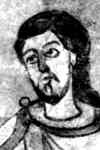
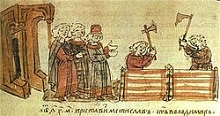

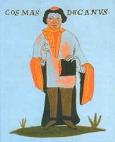
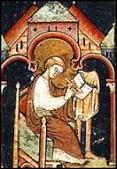
1125 On Jan. 24 David IV the Builder (b. 1073) dies, and his eldest son (a poet) Demetre (Demetrius) I (1093-1156) becomes king of Georgia (until 1156), suffering an immediate attack by the Seljuks in Georgian-held Ani in Armenia and ceding it to them as a vassal. On Apr. 12 Vladislav II (b. 1065) dies, and his brother Sobeslav I Oldrich (1075-1140), son of king Vratislus II becomes duke of Bohemia (until 1140), becoming a Bohemian nationalist not supporting the HRE, and the first Bohemian duke to rule as a king. On May 19 grand prince (since 1113) Vladimir II Monomakh (b. 1053) dies, ending the last good period in Kiev, and his eldest son Mstislav I Vladimirovich the Great (1076-1132) becomes grand prince of Kiev (until Apr. 14, 1132), while his other sons Yaropolk II (-1139) and Yuri Dolgoruki (-1157) chafe at the bit. On May 23 last Salian German king and HRE Henry V (b. 1081) dies after leading an expedition against Louis VI of France; his widow Matilda returns to England; after Leopold III of Austria turns it down, and Duke Henry IX the Black of Bavaria supports his son-in-law Duke Frederick II of Swabia (1090-1147), then flops after a promise of marriage of his son Henry X to Lothair's only daughter Gertrud, Saxon duke Lothair II/III of Supplinburg (1075-1137) is elected king of Germany (until 1137) over Henry V's nephew Frederick of Hohenstaufen, causing Frederick and his brother Duke Conrad of Franconia (later Conrad III) to make war on Lothair; Lothair also bans Frederick, causing Henry IX to abdicate and retire to a monastery to avoid having to take part in his prosecution. On June 11 (13?) after Aq-Sunqur il-Bursuqi receives reinforcements from atabeg of Damascus (since 1104) Toghtekin (-1128) and seiges Azaz N of Aleppo in the County of Edessa, a Crusader army of 1.1K knights and 2K infantry led by Baldwin II, Joscelin I of Edessa, and Pons of Tripoli win a decisive V over the Seljuk Turks under Aq-Sunqur il-Bursuqi at the Battle of Azaz in N Syria after pretending to retreat to draw them into the open and surround them, using the booty to ransom POWs incl. the future Joscelin II of Edessa, avenging the 1119 D at Ager Sanguinis. In Sept. Alfonso I the Battler of Aragon sets out S with an army of 4K knights, and travels down the E coast, bypassing the cities while ravaging the countryside, reaching Guadix unopposed in Dec. In Sept. the Jingkang Incident (Humiliation of Jingkang) begins (ends Mar. 1127) when the Jurchen-led Jin Dynasty sieges and sacks Bian Jing (Bianjing) (modern-day Kaifeng), capital of the Song Dynasty, capturing Emperor Qinzong along with his father Emperor Huizong and many members of the imperial court, causing the Song Dynasty to cede all territories N of the Huai River. A Scottish Gaelic revolt led by Alexander I's bastard son Malcolm (who marries the sister of Somerled, lord of Argyll) is put down. Hugh I dies, and his son Theobald II the Great (1090-1152) becomes count of Champagne, France (until Jan. 10, 1152). Pope Honorius II grants Cencio II Frangipane the county of Ceccano, allowing him to sack the Abbey of Montecassino. Anyway you slice it, men are men and women are women? Peter Abelard becomes abbot of St. Gildas de Rhuys in Brittany, and appoints his former playboy bunny Heloise as abbess of a nunnery in the Paraclete, allowing him to visit her frequently; too bad, he is suspected of a too able tongue and has to stop the visits, going on to write The Story of My Calamities, causing Heloise to begin their famous medieval soap opera Letters of Abelard and Heloise, a real Christian guilt-trip show, where Pete Abeless is reduced to a pure passionless brain and she is friggin' her pen and jumping with passion but intellectualizes it as love of him as a philosopher - jeesh, sign me up for NOW? Music: About this time thanks mainly to Duke William IX the Troubadour of Aquitaine (1071-1127), Trouvere and Troubadour musicians of aristocratic birth begin writing poems and performing music idealizing courtly love, Richard Lionheart becoming a famous one; starting in Occitania, France, they spread to Italy, Spain, England, and as far as Greece, becoming kaput with the Black Plague about 1350. Nonfiction: About this time The Book of Llandaff (Liber Landavensis) (Llyfr Llandaf), a history of Llandaff diocese in Wales is written. Bilhana of Kashmir, Vikramankacharita; written in praise of his host Vikramaditya VI of Kalyani, who gives him a blue parasol and an elephant. William of Malmesbury (1095-1143), Gesta Regum Anglorum (History of the English Kings); covers 449-1120 C.E.; ca. 1140 he writes a 2nd. ed. covering up to 1127, dedicated to Earl Robert of Gloucester, "disclosing in his second thoughts the mellowing of age"; Gesta Pontificum Anglorum (Deeds of the English Bishops), covering from St. Augustine in 597, claiming that the 1066 Norman Invasion saved England from the barbarities of the Anglo-Saxons and restored it to the Latin culture of the continent, going so far as to Latinize Anglo-Saxon names; this work plus his acquaintance with Bishop Roger of Salisbury, who has a castle there gets him offered the position of abbot of Malmesbury Abbey in 1140, which he declines, instead starting his 3-vol. Historia Novella (Modern History), covering from 1128-42, incl. accounts of The Anarchy (Nineteen-Year Winter) (1135-54) during the reign of King Stephen; too bad, he dies before he can finish it. Alexander Neckam (1157-1217), De Utensilibus; earliest account of the Mariner's Compass, allegedly invented by Flavio Gioja of Amalfi, Italy. Tarnenari, O-Kagami; history of Japan from 851-1036. Births: Norwegian king (1142-57) Eystein (Oystein) II Haraldsson (d. 1157) in Scotland; son of king Harald Gille and Gaelic babe Bjaook; brother of Inge. Danish king (1146-57) Sweyn III Grathe (d. 1157); bastard son of Erik II. French prince of Antioch (1153-61) Raynald (Reynald) (Reginald) of Chatillon (d. 1187) in Chatillon, France; husband (1153-63) of Connstance of Hauteville (1128-63) and (1175-87) Stephanie of Milly (1145-97). English Cistercian bishop of Worcester (1180-84) and archbishop of Canterbury (1184-90) Baldwin of Ford(e) (d. 1190) in Exeter; Persian Muslim scholar-soldier Imad ad-Din al-Isfahani (Muhammad ibn Hamed Isfahani) (d. 1201) in Isfahan. Deaths: Bohemian scholar Cosmas of Prague (b. 1045) on Oct. 21; leaves Chronica Bohemorum (Chronicle of the Bohemians) (3 vols.); from Creation to 1125. Russian grand prince of Kiev (1113-25) Vladimir II Monomakh (b. 1053) on May 19 in Kiev. French chronicler abbot Lambert of St. Bertin (b. 1060) on June 22 in St.-Bertin. Bohemian duke Vladislaus I (b. 1065) on Apr. 12. Georgian king (1089-1125) David IV the Builder (b. 1073) on Jan. 24. French count of champagne (1093-1125) Hugh I (b. 1074). German Salian king #4 and HRE (1106-25) Henry V (b. 1081) on May 23.


1126 On Jan. 18 Chinese Song emperor (since Feb. 23, 1100) Huizong (b. 1082) is captured by the Jin Dynasty, going on to spend the last nine years of his life in captivity, dying on June 4, 1135. On Jan. 25 Baldwin II wins a V over the Damascenes at the Battle of Marj es-Suffar, but his losses are too heavy to permit the conquest of Damascus. On Mar. 8 queen (since 1109) Urraca I (b. 1079) dies, and her son Alfonso VII (1105-57) (king of Galicia since 1111, who first used the title Emperor of All Spain incl. Christians and Muslims with her when she gave him the rule of Toledo in 1116) becomes king of Leon and Castile (until Aug. 21, 1157), and begins working to recover Castile from Alfonso I the Battler of Aragon and Navarre; Portugual defeats Leon, insuring its independence. On Dec. 13 Henry IX the Black (b. ?) dies in Weingarten Abbey, and his son (Lothair III/II's son-in-law) Henry the Proud (1108-39) becomes duke Henry X of Bavaria (until 1139). The Peace of 1126 with the Hungarians gives the vital Danube River bridgehead of Branicova to the Byzantines. The Aragonese under Alfonso I the Battler defeat the Murabitun at the Battle of Arinzul near Lucena; after symbolically fishing at Motril on the S coast, Alfonso returns home undefeated. The Crusaders capture the Mediterranean seaport of Jaffa, but soon lose it to the Muslims. Song Wei Zong dies, and Song Qin Zong (-1127) becomes Bei (Northern) Song emperor #9 of China. Western Chalukya king (since 1076) Vikramaditya VI (b. ?) of Kalyani in S India dies, after which the Cholas begin slowly encroaching on Vengi. The Manchurians capture the Chinese capital of Bian Jing. After the Venetian fleets ravage the islands of the Aegean and occupy Corfu and Cephalonia, Emperor John II Comnenus cries uncle and renews their commercial privileges. Greenland, part of the German diocese of Hamburg-Bremen receives its own bishop, Bishop Arnald, complete with power to consecrate priests; he shows the natives how to make sacramental wine from crowberries, builds a cathedral at Gardar, and beefs Greenland up to 16 parishes; the Cyclopean style of masonry is borrowed from the Scots? Deposed Norman duke Robert Curthose is put in the custody of Robert, 1st Earl of Gloucester in his castle in Cardiff. Inventions: The first artesian well in Europe is bored in Artois, France by Carthusian Monks. Births: Spanish Muslim superbrain scholar-philosopher-physician Averroes (Abu'l Waleed or Abu al-Walid Muhammad ibn Rushd) (d. 1198) on Apr. 14 in Cordova; father and grandfather are chief justices of Cordova; becomes chief justice of Seville in 1169, and of Cordova in 1172. Polish duke (1138-1202) Mieszko III (the Old) (d. 1202); 4th son of Boleslaw III the Wry-Mouthed (1085-1128) and Salome von Berg-Schelklingen (1093-1144) (daughter of Duke Henry of Berg). Deaths: English king-for-a-day (1066) Edgar Aetheling (b. 1051). French troubador William IX of Aquitaine (b. 1071) on Feb. 10; leaves 11 songs in the Romance vernarcular of Provencal (Occitan); "The Count of Poitiers was one of the most courtly men in the world and one of the greatest deceivers of women. He was a fine knight of arms, liberal in his womanizing, and a fine composer and singer of songs. He travelled much through the world, seducing women." (anon.). Spanish queen of Leon, Castile, and Balicia (1109-26) Urraca (b. 1079) on Mar. 8 in Saldana, Castile. Bavarian duke (1120-6) Henry IX the Black (b. ?) on Dec. 13 in Weingarten Abbey.


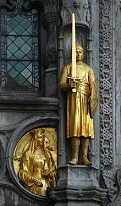
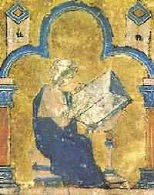


1127 On Jan. 1 Henry I gets the English barons to recognize his daughter Empress Matilda as his heir; his eldest bastard son Robert, 1st Earl of Gloucester, who has been given control of Kent and the castle controlling the cross-Channel route is the first to swear - anything to humor the old fart? On Mar. 2 Charles the Good (b. 1084), count of Flanders since 1119 is murdered during prayers in Bruges, causing a struggle for succession in Flanders, which is settled when Louis VI the Fat of France places William Clito (1102-28) (son of Duke Robert Curthose) on the throne as count #14 of Flanders on Mar. 30 (until July 28, 1128), once again bypassing the distinguished bastard William of Ypres; too bad, English-backed Thierry (Dietrich) of Alsace (1099-1168) challenges him, causing Saint-Omer and Ghent to declare against him next Feb., followed in Mar. by Bruges, and in May by Lille, leaving Clito with the S clit, er, fringe of Flanders. On June 27 Baldwin II of Jerusalem captures Tyre after a 5-mo. siege, and reconstructs the cathedral that was destroyed in 303 C.E. during the Diocletian persecution; starting in 1244 the kings of Jerusalem are crowned here, and HRE Frederick I Barbarossa is entombed here in 1190. On June 12 after the Manchurians kidnap Song Qin Zong and his father, Gao Zhong crowns himself Song Gao Zong (11007-7), Nan Song emperor #1 of China (until July 24, 1162), with Nan Jing (Najing) (Chin. "southern capital") as the capital; the Northern (Bei) Song Dynasty (founded 960) is replaced by the Southern (Nan) Song Dynasty (ends 1279). Also in 1127 Ly Can Duc dies, leaving no heir, causing Vietnam to degenerate into civil wars for the rest of the cent. (until 1225). In July Duke William II of Apulia (b. 1095) dies without heirs, leaving the entire Norman Mezzogiorno to his cousin Roger II of Sicily. On Aug. 27 (Pentecost) Geoffrey V "Le Bon" Plantagenet, Count of Anjou (1113-51) marries Empress Matilda (Maude) (1103-67), daughter of Henry I of England and widow of HRE Henry V; David I of Scotland becomes the first secular lord to swear an oath to uphold Matilda's rights to succeed to the English throne should his liege lord Henry I produce no male heir, in return for Henry acquiescing in the ecclesiastical freedom of Glasgow and St. Andrews from York; being an empress and way-outranking him, as well as being 10 years older, she turns out to be a, er, you can figure it out; next year Geoffrey's daddy Count Fulk leaves to become king of Jerusalem, letting him be the cunt, er, count of Anjou, which may or may not have helped. Welf Henry the Proud (1108-39) marries HRE Lothair II/III's only child Gertrude of Supplingenburg (1115-43), making him heir apparent and the most powerful German noble; meanwhile, like dark clouds on the horizon, his rival Duke Conrad of Franconia (later Conrad III of Germany) is elected antiking to Lothair II/III. Alfonso I the Battler of Aragon and Navarre signs the Peace of Tamara, recognizing new Spanish emperor Alfonso VII of Leon, who invades pesky Portugal to the S (ends 1128). Norman count Roger II of Sicily is recognized as duke of Apulia and Calabria. Louis VI the Fat of France becomes so fat that he can no longer mount his horse. Atabeg (Turkish cmdr. ruling in the name of a minor Seljuk prince) Imad al-Din Zangi (-1146) establishes his own principality in Mosul (ends 1222), followed by Aleppo next year, going on to extend his state from N Mesopotamia to N Syria as far S as Homs - a sign of the decay of the Seljuk Empire? Ly Can Duc dies, leaving no heir, causing Vietnam to degenerate into civil wars for the rest of the cent. (until 1225). Births: Japanese emperor #77 (1155-8) Go-Shirakawa (Masahito) (d. 1192) on Oct. 18; 4th son of Toba (1103-56). French count of Champagne (1152-81) Henry I the Liberal (d. 1181) in Dec.; eldest son of Theobald II (1090-1152) and Matilda of Carinthia. French archbishop of Tyre (1175-86) William (Guillaume) (II) (d. 1186) in Jerusalem. Deaths: French troubadour Guillaume de Poitou (b. 1070) - one of the first to trouble the doors of maidens? Norman noble Charles the Good (b. 1084) on Mar. 2 in Bruges (murdered). Norman duke William II of Apulia (b. 1095) in July.
1128 On June 21 the Battle of Axspoele S of Bruges is a V for William Clito (b. 1102) and his Norman knights and French allies against Thierry of Alsace; on July 12 Clito and Count Godfrey I of Louvain siege Aalst in Belgium; too bad, on July 28 after getting wounded in the arm, which turns gangrenous, William Clito dies, and Thierry (Dietrich) of Alsace (1099-1168) becomes count #15 of Flanders (until Jan. 17, 1168), going on to go on four campaigns in the Levant and Africa incl. the Second Crusade; William of Ypres (b. 1090) strikes out 3x, and is banished from Flanders in 1033. On June 24 after Alfonso VI of Leon appoints her to govern Galicia, and the pop. revolts, the Battle of Sao Mamede near Guimaraes sees Afonso I Henriques defeat his mother Teresa and her lover Galician Fernao Peres de Trava, giving himself the title of prince of Portugal in 1129; she ends up in a monastery; Guimaraes becomes the first capital of independent Portugal. Louis VI the Fat of France begins a power struggle with the powerful Garlande family, which he wins in 1130. Qudbaddin Muhammed dies, and his son Atsiz (-1156) becomes shah #2 of Khwarzem (until 1156). Imad al-Din Zengi (Zenghi) (Zangi) (Zengui) (Zenki) (Zanki) I (1085-1146) of Mosul captures Aleppo, Syria from the Artuquids (who held it since 1117), founding the Zengid (Zangid) Dynasty (ends 1250), which goes on to unite Aleppo and Mosul and rules parts of the Levant and Upper Mesopotamia on behalf of the Seljuk Empire, disintegrating Crusader control of N Syria and causing the Assassins (Hashashins) Cult to flee to the N Syrian coast and build the mountain fortress of Alamut in the Alborz Mts. S of the Caspian Sea in Persia, going on to stage suicide missions until the Mongols destroy their base in 1256; each leader takes the title of Sheikh (Shaykh) al-Jabal ("the mountain chief") - I start up each day with a loosening-up exercise? Cencio II Frangipane and Cardinal Aimerico of Santa Maria Novella are sent by Pope Honorius II to Sicily to invest Roger II with the duchy of Apulia. Keep your age to yourself? After the Templars emerge from nine years locked up inside the Temple Mount of Jerusalem (and still haven't rescued any pilgrims?), the Synod (Council) of Troyes in France (the city that gives troy weight its name) and Pope Honorius II recognize the Order of the Knights Templar and their austere Cistercian-based rule, and they begin gaining wealth and power at jet speed, helped by being left in many peoples' wills, becoming the bankers of Europe, complete with the first traveler's checks, encrypted deposit notes that pilgrims can carry between Templar stations all the way to the Holy Land, making them an internat. banking org. above all kings and answerable only to the pope, stirring envy and resentment, esp. from kings who owe them money, and giving later conspiracy theorists plenty of material; "A sure sign of a lunatic is that sooner or later, he brings up the Templars" (Umberto Eco). The town of Graz (Slovenian "little castle") in Austria 120 mi. SW of Vienna (known for its Mediterranean weather) is first mentioned - and its barbell-pumping tweedy freaks like Ahnuld? Architecture: After granting a burgh charter to the 6th cent. Celtic town of Edinburgh (Edenesburg) (originally "Din Eidyn" - hill fort of Eidyn) (modern-day pop. 794K/488K), David I of Scotland refounds Dunfermline Abbey as the #1 royal abbey, also founding the Augustinian Inchcolm Abbey on an island in the Firth of Forth (begun /by Alexander I), and the Augustinian Holyrood Abbey in Edinburgh on a site where he was allegedly miraculously saved from a stag attack when the lost holy rood (cross) fell from its antlers into his hands, causing the animal to turn and flee; Holyrood Church becomes a refuge for criminals and debtors; in the early 1300s it is expanded and turned into Holyrood House; in the 15th cent. it becomes a palace; in 1671-8 a new Holyrood Palace is built in a quadrangle layout; David I later founds the Augustinian Cambuskenneth (Stirling) Abbey; Edinburgh is not granted city status until 1889. St. James the Great's Cathedral in Santiago de Compostela, Galicia, Spain (begun 1060) is consecrated in the presence of its biggest backer Alfonso IX of Leon; it is not completed until 1211. Grimbergen Abbey is founded in Belgium by Norbertine monks, founding a beer brewery that survives to modern times, producing Grimbergen Blonde et al. Births: French princess of Antioch (1130-63) Constance of Antioch (d. 1163); only child of Bohemond II of Antioch and Alice of Jerusalem; brother-in-law of Fulk of Anjou; wife (1136-49) of Raymond of Poitiers (1115-49), and (1153-63) Raynard of Chatillon (1125-87); mother of Bohemond III (1144-1201), Maria of Antioch (114-82), Philippa of Antioch (1148-78), and Agnes of Antioch (1154-84). French archbishop of Caesarea (1175-) and Latin patriarch of Jerusalem (1180-7) Heraclius (Eraclius) (d. 1191) in Auvergne; educated at the U. of Bologna. rival of William of Tyre. Danish soldier-statesman-ecclesiastic Absalon (Axel) (d. 1201); educated in Paris; archbishop of Lund (1178-1201); Danish historian Saxo Grammaticus is his secy. Deaths: Spanish queen of Castile-Leon (1109-26) Urraca I (b. 1082) on Mar. 8. French duke of Normandy and count of Flanders (1127-8) William Clito (b. 1102) on July 28 in Aalst (gangrene); bured in St. Bertin Abbey, Saint-Omer, Flanders. Italian Pierleoni Family founder ("the Jewish Crassus" - Ferdinand Gregorovius) Pier Leoni (Pierleone) (b. ?); son of Leo de Benedicto Christiano (Benedictus Christianus), a rich Jew from Trastevere who converted and was baptized by Pope Leo IX; buried in the Basilica of St. Paul Outside the Walls, with an inscription "A man without equal, immeasurably rich in money and children"; father of Antipope Anacletus II (Pietro Pierleone) (-1138) and Giordano Leoni.


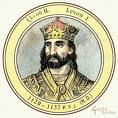
1129 On June 2 after going on Crusade in 1120 and becoming a close friend of the Knights Templar, and being about to return to Anjou in 1127 when Baldwin II made him an offer he couldn't refuse (after William I Bures and Hugues de Payens returned empty-handed from a mission to France to find her a better hubby), Count Fulk (Fulques) V the Young of Anjou (1089-1143), marries his daughter Melisende (Melusine) (Melisanda) (1105-61) putting him in line to become king-consort of Jerusalem when he dies (1131); after Sunni Damascus ruler (since 1128) Taj al-Din Buri (-1132) orders the massacre of 6K Ismaili Muslims after hearing rumors that they are conspiring with the Crusaders to give them the strategic fort in Banias (named after the Greek god Pan) at the foot of Mt. Hermon N of the Golan Heights in return for control of Tyre, a 60K-man Latin army incl. the Templars head to Damascus with 60K troops, causing Buri to ally with Imad al-Din Zengi of Alepoo to stop them, gaining reinforcements from Hama as well as Turkomen and Arab allies; too bad, a division under constable William I of Bures sets off to gather supplies, and is intercepted by a Muslim force in Buraq (Braq) (Burak) (modern-day Al-Buraq) SE of Hama, ending the Latin offensive before the army reaches the city; meanwhile Fulk leaves Anjou (incl. Maine and Touraine) to his son Geoffrey V Plantagenet, causing Louis VI the Fat to worry about the Anglo-Norman menace. The Aragonese under Alfonso I the Battler defeat a Murabitun army (which incl. many black slaves) led by Ali ibn Majjuz, gov. of Seville deep inside Valencian territory at the Battle of Alcira. Toros I dies, and his son Constantin (Gosdantin) II (b. 1035) becomes king of Lesser Armenia (Cilicia), but a few mo. later a palace intrigue has him imprisoned and poisoned, and Toros I's brother Levon (Leon) I (-1140) becomes king of Lesser Armenia (until Feb. 14, 1140). Lothar III permits citizens of Duisburg to break stones in the woods; the oldest deed in the city archives dates to this year. Births: German Saxon duke (1142-80) and Bavarian duke (1156-80) Henry the Lion (d. 1195); son of Henry the Proud. Deaths: Japanese emperor #72 (1073-87) Shirakawa (b. 1053) on July 24.